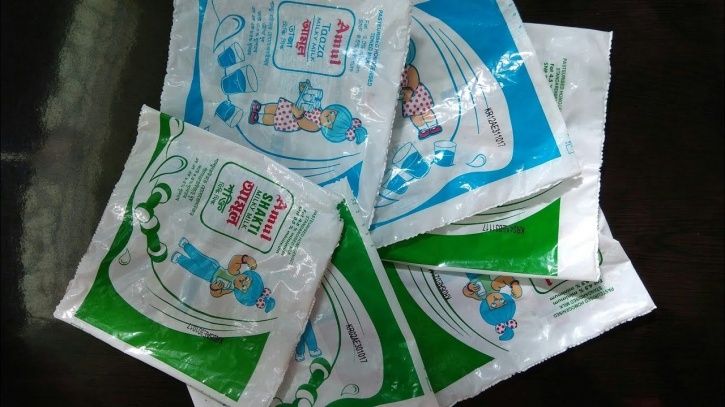Srinagar: Jammu and Kashmir government has introduced a buyback policy wherein the customers will be refunded upon returning used milk packets to the vendors in a bid to reduce plastic pollution.
The decision was taken by Divisional commissioner Kashmir PK Pole. He directed the milk companies to cut down significantly on single-use plastic.
“Around 43000 milk pouches (Amul/snowcap) have been taken back from the consumers under the buyback policy and approximately 1500 liters of milk have been provided to the consumers in lieu of these pouches,” a senior official of Jammu and Kashmir Milk Producers’ Cooperative Ltd. (JKMPCL) told The Kashmir Monitor.
He maintained the authorities will penalize the milk companies for not taking initiatives to bring down the use of plastic pouches.
“Moreover, an estimate shall be framed on a daily sale/consumption basis to impose a fine on these companies by SMC/ULB. Also, we shall organize functions with the manufacturers and entrepreneurs of non-plastic bags, jute bags, paper bags, cloth bags shall be encouraged,” the official said.
Single-use plastics are disposable plastics meant for use and throw. These comprise polythene bags, plastic drinking bottles, plastic bottle caps, food wrappers, plastic sachets, plastic wrappers, straws, stirrers, and Styrofoam cups or plates.
Environmental Expert and Senior Assistant Professor Department of Geoinformatics, University of Kashmir, Dr. Irfan Rashid said plastic waste causes a plethora of problems when it leaks into the environment. They can block waterways and exacerbate natural disasters.
“By clogging sewers and providing breeding grounds for mosquitoes and pests, plastic bags can increase the transmission of vector-borne diseases like malaria. High concentrations of plastic materials, particularly plastic bags, have been found blocking the airways and stomachs of hundreds of species. Further, disposing of plastic waste by burning it in open-air pits releases harmful gases like furan and dioxin,” Dr. Irfan said.
Commenting on the buyback scheme, he said the policy essentially hopes to put a mechanism in place for the collection of used plastic bottles and empty pouches from the consumers by the retailers and then the onus of scientifically recycling this collected plastic waste would be on the manufacturer.
“If implemented properly, this would help in reducing the amount of plastic waste being discarded indiscriminately clogging up water bodies or piling up in landfills,” he said.
Discover more from The Kashmir Monitor
Subscribe to get the latest posts to your email.




